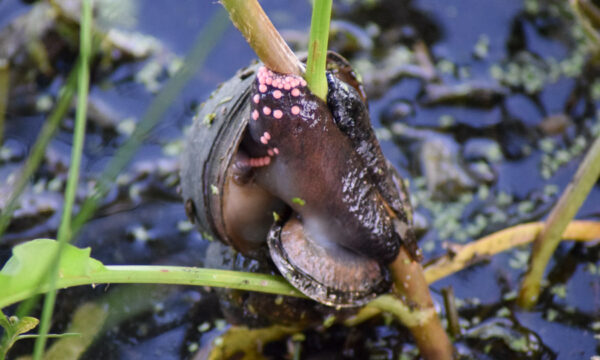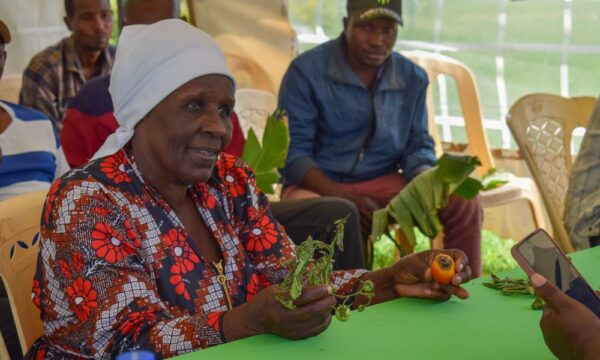
PRISE Stakeholder workshop participants, July 2018.
Earlier this month, members of the Pest Risk Information Service (PRISE) consortium held a stakeholder workshop in Kenya to update partners, donors and stakeholders on the progress of the project and to discuss future developments over the next four years.
The 2-day workshop was held in Machakos, providing presentation materials updating on the progress of PRISE and the systems involved to produce the pest forecasts. Interactive sessions were implemented across the 2-day event, covering topics targeted towards the future of PRISE such as future user groups, dissemination channels, priority pests and crops, and sustainability.

Dr Lusike Wasilwa, Director of Crop Systems, KALRO and Amos Tabalia, ACRE Africa, downloading the Telegram app and signing up to the PRISE pest forecasts.
Members of CABI from the UK and Africa offices held the event, inviting other member of the project team including ASSIMILA, Kings College London, and consultants to be involved in engaging with stakeholders. Participants of the workshop included representatives from the Ministry of Agriculture (Embu, Machakis and Kitale counties), the Kenyan Agriculture and Livestock Research Organisation (KALRO), Kenya Plant Health Inspectorate Service (KEPHIS), and private institutions.
The final part of the workshop included a field visit to a KALRO research station and farm in Katumani in which calibration and validation work is being undertaken to determine the level of accuracy of the PRISE weekly pest forecasts. The work being done here by researchers involves monitoring pest activity on specific crops using pheromone traps throughout the rainy season to evaluate and support the forecasts that are currently being sent out to over 500 plant doctors across Kenya via the Telegram app.
Workshop Outcomes:
To update the national stakeholders on project activities since the project launch in March 2017 and to plan the next activities for 2018/19. Feedback was received on previous PRISE baseline pest alerts for the 2018 long rain reason. Other aims included widening the users targeted, refining of both rainfall biofix data and pest development models for fall armyworm and bean fly.
The Future of PRISE:
Targeting more users with refined pest alerts during the next annual release of a new version of PRISE (Knowledge) to reach up to 24,000 users and strengthen collaborations between the lead partners and stakeholders.
We would like to take this opportunity to thank everyone from the PRISE consortium who took part and helped with the workshop and to give thanks to all of the participants who have provided much valued feedback and support.
Related News & Blogs
Biocontrol that goes the distance: Acerophagus papayae in Kenya
Acerophagus papayae can slow the spread of the invasive papaya mealybug and benefit the wider community. Recent monitoring efforts have shown that the natural enemy is reaching long distances away from the original release sites. Papaya mealybug attack…
20 May 2025




